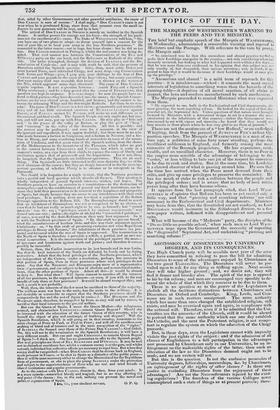THE MARQUIS OF WESTMINSTER'S WARNING TO THE PEERS AND THE MINISTRY.
THE brief but emphatic speech of the Marquis of WESTMINSTER, on Wednesday, administered a seasonable warning and reproof to Ministers and the Peerage. With reference to the vote by proxy, the Marquis said " So convinced was he that this anomalous and absurd practice ter4.1 tO make their Lordships unpopular in the country,—not only considering what had formerly occurred, but looking to what had happened even within a few days,— that he was tuore than ever confirmed in his opinion that this subject was not only worthy of, but demanded, their serious attention ; and, in truth, it appeared to him that it would be decorous if their Lordships would at once gite up the privilege."
" Anomalous and absurd " is a mild term of reproach for this practice : it is mischievous—wicked : it commits the most sacred interests of legislation to something worse than the hazards of the gaming-table—it deprives of all moral sanction, of all claim to respect, the laws and resolves manufactured by such mechanism.
The Marquis proceeded to remind Ministers what was expected from them.
" He expected to see, both in the Ecclesiasticaland Civil departments, the most piercing, the most searching reform. He looked for tire repeal of that disgraceful act, the Septennial Act. Unless questions of that nature were brought forward by Ministers with a determined design to act in a manner the alo,t satisfactory to the inhabitants of this country—unless the Government wer.. determined to act with vigour and sincerity—he feared that they would re long remain in those places where he Was very glad to see them at present."
These are not the sentiments of a "low Radical," or an unfledged Whigling, fresh from the perusal of JUNIUS or Fox's ardent Opposition speeches. The Marquis of WESTMINSTER is a man of mature age, a politician of some forty years' standing, perhaps the wealthiest nobleman in England, and formerly among the most extensive of the Borough proprietors. He has experience, rank, wealth, and an unsullied character. Moreover, there is no Peer in the empire more sensible of the advantage of belonging to the "order, or less willing to bate one jot of the respect he conceives to be due to rank and station. But at the same time, his Lordship is a shrewd observer of what is passing around him. He sees that the time has arrived when the Peers must descend from their stilts, and give up some privileges to preserve the remainder. He has too much at stake to risk a collision between the people and the privileged orders ; and is aware that no body of men retain power long after they have become odious. It appears from the last paragraph cited, that Lord WESTMINSTER is of opinion that Reform has been as yet carried only a little way, and that "piercing and searching reforms " are still necessary in the Ecclesiastical and Civil departments. Ministers may learn from this, that the dissatisfied are not confined, as Lord BROUGHAM would insinuate in the Edinburgh Review, to a few newspaper writers, inflamed with disappointment and personal spite. What will become of the "Moderate" party, the disciples of the "Do-as-little-as-possible-school," when such mcn as Lord WESTMINSTER urge upon the Government the necessity of repealing the "disgraceful' Septennial Act, and undertaking "piercing awl searching reforms ?"




















 Previous page
Previous page